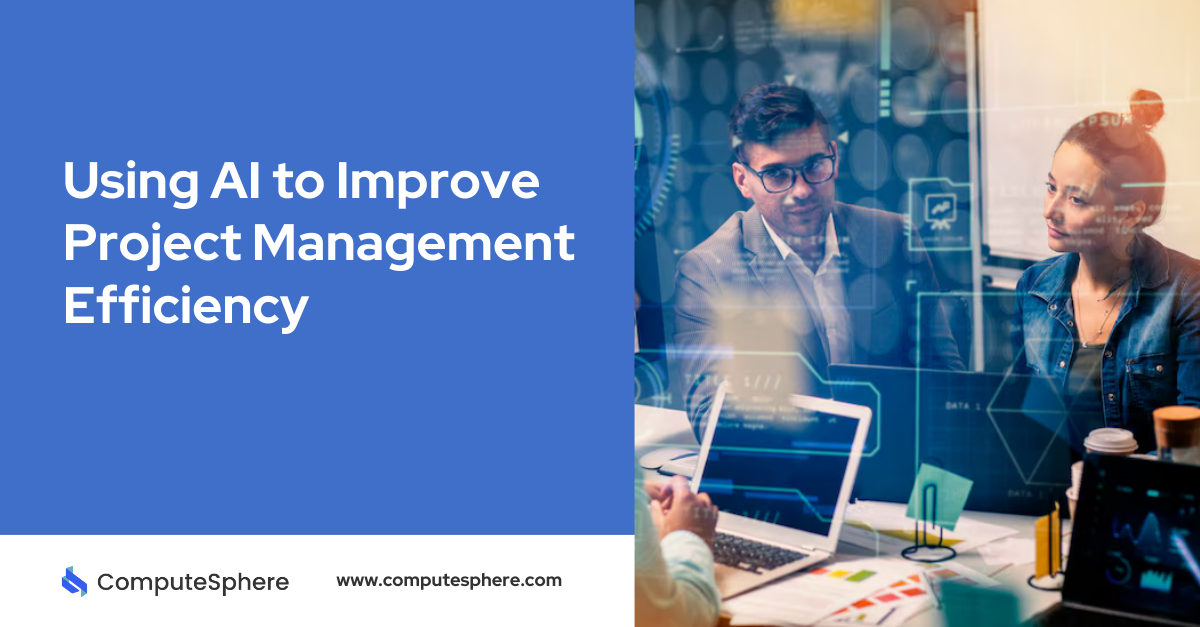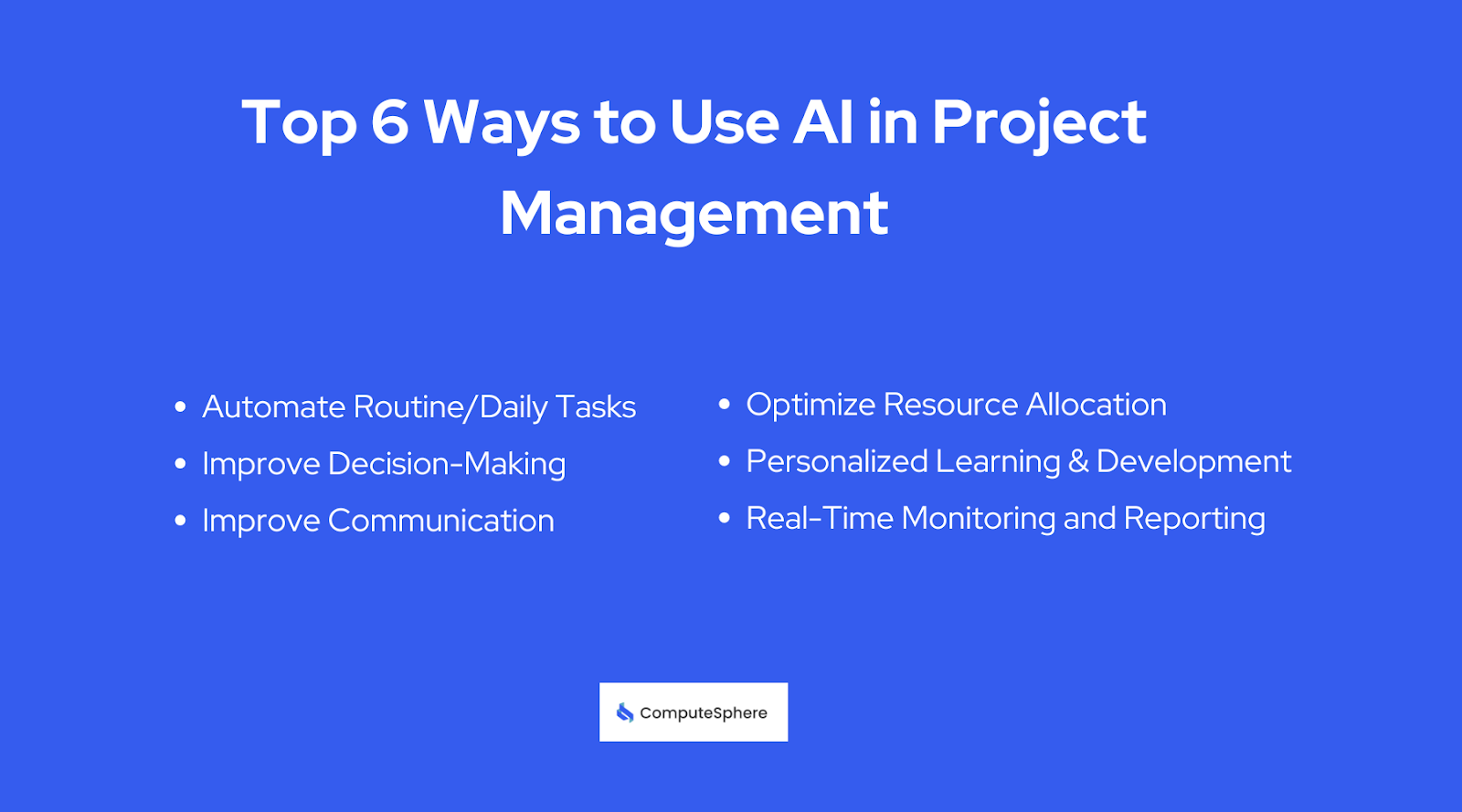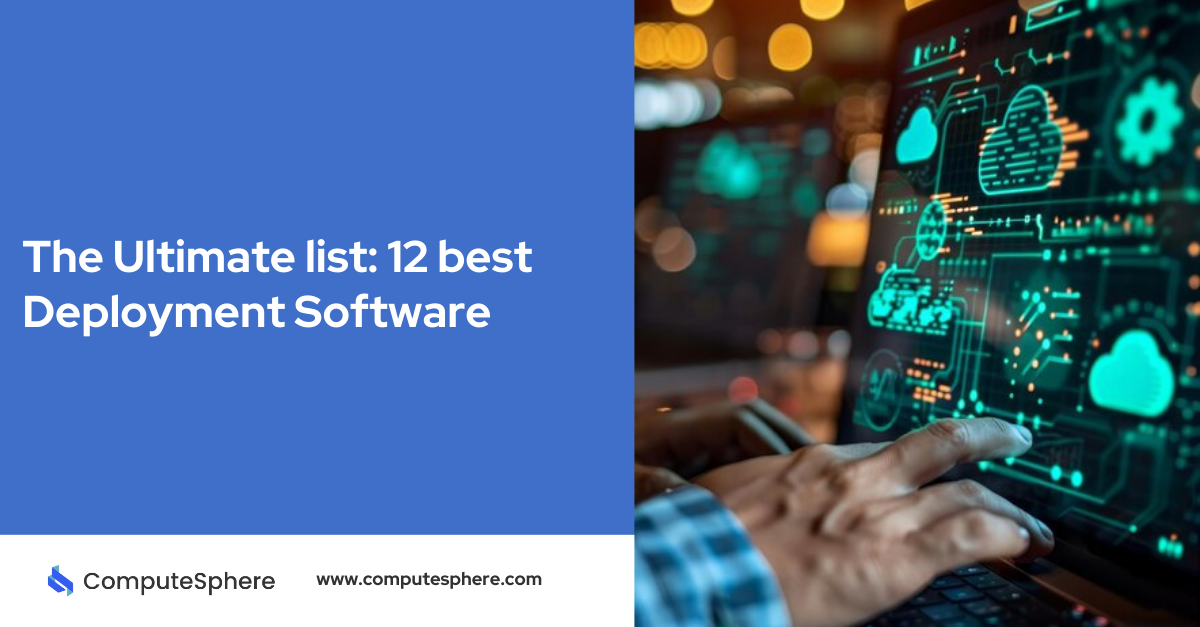How to use AI for Project Management ? 6 Ways to Boost Efficiency

Managing projects has become increasingly complex in a modern business environment. With multiple tasks, tight deadlines, and various teams, managing projects efficiently can be quite a challenge. Implement effective solutions to streamline processes and enhance productivity. Using AI, you can significantly improve how you handle these challenges. Moreover, with the help of AI, project managers can optimize resource allocation, enhance decision-making, and improve overall team collaboration
This article explores six practical ways to use AI in project management to improve efficiency and reduce human errors.
What is AI in Project Management?
AI in project management describes the integration of artificial intelligence technologies, such as machine learning and natural language processing, into project management methodology processes to enhance efficiency, decision-making, and streamlined processes.
AI tools can analyze large datasets to provide valuable insights, helping project managers make better decisions and anticipate potential challenges.
Additionally, AI can enhance communication and collaboration within teams by providing real-time updates and facilitating smoother information exchange. By integrating AI, you can streamline workflows, optimize resource allocation, and improve overall project efficiency.
Top 6 Ways to Use AI in Project Management

Here are six ways to use AI for project management that can significantly improve its implementation and impact. The approaches range from better decision-making and resource allocation to planning and maintenance strategies.
Automate your Routine/Daily Tasks
Routine tasks such as scheduling, reminders, and data entry can consume a lot of time. By automating these tasks, project managers and team members can focus on more critical aspects of the project. This automation reduces human error, saves time, and increases productivity.
Improve Decision-Making
Advanced technologies can process large amounts of data to provide valuable insights, helping project managers make informed decisions. This includes identifying trends, predicting outcomes, and suggesting the best course of action. By using data to drive decisions, project managers can improve accuracy and leverage predictive analytics to anticipate future challenges and opportunities.
Improve Communication
Effective communication is crucial for project success, and AI can significantly enhance this by facilitating better interactions within the team and with stakeholders. By providing instant responses to queries and summarizing meeting notes, AI ensures faster response times, reducing delays and keeping the project on track.
Optimize Resource Allocation
Optimizing resource allocation means analyzing project needs and available resources to assign the right resources to the right tasks at the right time. This approach helps project managers balance workloads, prevent over-allocation, and ensure no resource is unutilized. By doing this, they improve efficiency and reduce excess. Additionally, predicting resource requirements based on ongoing projects allows proactive adjustments and better planning.
Personalized Learning and Development
Identifying skill gaps within the project team involves analyzing individual performance and comparing it with project requirements. Recommending personalized training programs to address these gaps ensures that team members continuously improve their skills, making them more effective in their roles.
Promoting a culture of continuous learning helps build a more competent and versatile project team. Tracking the progress of these training programs and adjusting them as needed ensures the team remains up-to-date with the latest tools and methodologies.
Real-Time Monitoring and Reporting
Creating detailed, real-time reports gives deep insights into project performance. These reports help project managers monitor progress, track key performance indicators (KPIs), and spot any deviations from the plan.
By offering clear and actionable data, managers can make quick, informed decisions. This visibility keeps projects on track and addresses issues promptly. Customizing reports for different stakeholders ensures each audience receives the most relevant information, improving communication and transparency.
Top 5 AI Project Management Tools
Find the top 5 AI project management tools given below.
1. Asana
Asana offers an easy-to-use interface with strong AI features that help manage tasks and improve team collaboration. It automates workflows, provides predictive analytics for planning, and integrates well with other tools. Asana is ideal for small teams and traditional project management.
2. ClickUp
ClickUp stands out for being affordable and customizable. It offers AI features like content writing, editing, summarizing, and translation, making it ideal for remote teams in different time zones. You can access ClickUp's AI tools in paid plans, and they are suitable for teams of any size.
3. Monday.com
Monday.com excels in project management and sales CRM integration. It uses AI to generate task lists and assist with writing and summarizing. This tool is best for large teams and those needing to integrate sales CRM with project management.
4. Trello
Trello is simple and user-friendly, using AI to manage strategies and improve productivity by controlling project visibility and task prioritization. Trello is well-suited for small teams, individuals, and small projects, particularly for content management.
5. Motion
Motion allows for its AI meeting scheduling and task prioritization features. It effectively syncs calendars, making it excellent for managing complex schedules. Motion is ideal for individuals and small teams looking to reduce decision fatigue and streamline calendar management.
How to Integrate AI in Project Management
Integrating AI into task management involves careful planning and execution. Here are nine steps to guide you through the process:
Identify Use Cases: First, pinpoint specific areas in project management where advanced technology can add value. This might include resource allocation, task prioritization, risk assessment, or improving communication.
Understand Data Needs: Next, determine what type of data and the quality required for implementation. Gather historical project data, relevant metrics, and other important information to support the integration.
Select Appropriate Tools: Choose tools that align with your project’s needs. Look for solutions offering predictive analytics, natural language processing, and automation capabilities that fit your objectives.
Prepare Your Data: Ensure your data is accurate and consistent by cleaning and preprocessing it. High-quality data is crucial for generating accurate insights.
Choose Suitable Algorithms: Select algorithms that best suit your use case. Examples include regression for predictions, clustering for grouping, and decision trees for decision-making processes.
Develop AI Models: Collaborate with data scientists or AI professionals to develop and train your models. Use historical data to train the models so they can make accurate predictions and recommendations.
Integrate into Workflow: Incorporate these capabilities into your existing project management tools. Ensure seamless communication and data exchange between the new components and your current systems.
Train Your TeamEducate project managers and team members on how to interpret the insights and recommendations. Proper training helps everyone make the most of the new technology.
Continuous Monitoring & Improvement: Regularly monitor performance and gather feedback to measure success. Make necessary adjustments to improve accuracy and relevance, ensuring the system continues to meet your needs.
Conclusion
AI in project management makes handling projects more efficient and productive. Automating routine tasks saves time for critical work. Developing insights based on data improves decision-making and planning. Advanced tools improve team communication and interactions.
Optimizing resource allocation uses resources effectively, balances workloads, and reduces waste. Personalized learning helps team members continuously improve their skills. Real-time monitoring and reporting provide clear insights into project performance, enabling quick decisions.
These methods help project managers streamline processes, reduce errors, and achieve better results. Integrating AI into project management keeps your organization competitive and ensures successful project completion. Use these strategies to boost your project's efficiency and success.
Contents
Built for Builders. Priced for Startups.
Tired of unpredictable cloud bills? ComputeSphere offers modular, fixed-cost cloud hosting that grows with your startup—no DevOps headaches, no surprises.
Get StartedShare this article
Browse Some Related Blogs
Relevant and related contents you can read









